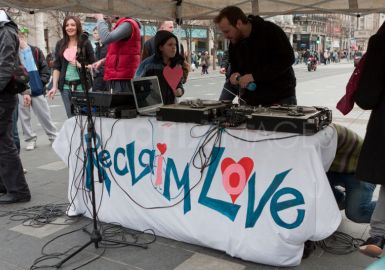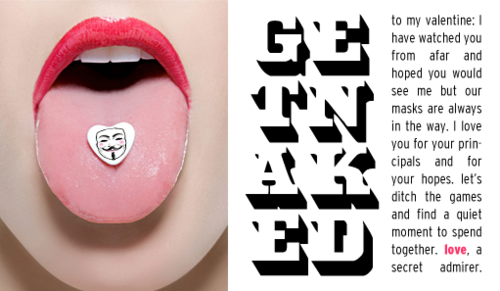Leditor Six by Martabel Wasserman
|
“If love does not know how to give and take without restrictions, it is not love, but a transaction that never fails to lay stress on a plus and a minus.” –Emma Goldman Writing about reclaiming love is like writing about fixing capitalism. A lot of good things have been said but it’s the theory/practice disconnect that always gets you. But love is not like capitalism. The textures of the joy and suffering it induces are not comparable. It is a lusher lust, a more satisfying and less sinister sadness. However, it is through capitalism’s logic that we are taught to love ourselves and each other. That is to say not very well… As novelist Jeanette Winterson wrote in “The money has gone, so lets make love our alternative currency,”an op-ed published by the Guardian last February 14th, love is not a commodity but we have come to treat it as such. Winterson charts how the idealism of the 1960’s was hijacked by Thatcher and Reagan, transforming love from an ethos to “something for the weekends.” She writes, “Love in an ecosystem. You can’t neglect it, exploit it, strip-mine it, pollute it and wonder what happened to the birds and the bees.”[1] Love always fights back against the regimes it lives under – from feudalism and failed experiments in communism to the neoliberal state where we currently reside. After all, it was love that started the rumor that objectivity may be a farce. It was love that gossiped about the failures of representation long before modernity dreamed of producing its rebellious offspring. What does it mean to reclaim love? There is the undeniably sucky experience of reclaiming the space in your heart colonized by a cold or cruel lover. Even the great Beyonce has admitted she is in fact mortal in the face of it, as she once said, “I am a human being and I fall in love and sometimes I don’t have control of every situation.” In these instances the theory/practice disconnect can be manifested by ignoring advice from friends and family who insist you lease that space to a more respectful tenant. Often times its best to open your heart up to a democratic decision making process in which your vote is equally weighted with your best friend, sister, barista, etc. But if we are collectively reclaiming love, we need to shift the focus from the self to the system. Love can be a tool for unlearning what is deeply ingrained, for de-familiarizing patterns we take to be innate. The first step in unlocking the power it yields is to understand how capitalism has configured it. “Our visions begin with our desires.”- Audre Lorde It is far more difficult to acknowledge the ways in which our practices, as consumers, cultural connoisseurs, and even critics, can support the 1% than it is to abstractly challenge their power. Rebecca Lieberman’s Valentine to the World’s Richest Men creates a pattern of hearts embedded with the Capitans of Industry. By making an uncomfortable conflation of business and the bedroom, the handbag and our heart, the image asks us to consider those connections beyond the canned critique of Hallmark and Hersheys control of our emotions this February. Laurie Simmons charts the extreme objectification and commodification of longing in The Love Doll, Days 1-36. Simmons has photographed uncanny scenarios with dolls, puppets and pictures since the 1970’s, but the life-size companion she discovered on a trip to Japan takes the questions of pleasure and play from the realm of the miniature and into Simmons’ living room. The love doll was shipped her Connecticut house, performing a fantasy of ladylike that requires her detachable genitals to be packed separately from her body. Simmons grafts neither character nor narrative onto her surface. The ultimate submission she is meant to embody is subverted by the subtle ways Simmons is able to animate her as a curious subject. The doll experiments with the materials of gender performance: from a wedding dress to some semi-butch flannel to a traditional geisha costume. She is never photographed looking directly at us in a simple one-to-one reversal of the gaze, but rather encourages our voyeurism until we some buried aspect of our own desire staring back. The work in this issue by Emily Roysdon and Liz Collins offer two examples of how small aesthetic interventions can chip away at normative ideas of citizenship, consumer and otherwise. Collins’s “Walking Wounded” is part of an on-going project originally staged in 2011 in which she offers to add wounds and ruptures onto the clothing of passerby’s. She literally deconstructs the notion of performing “togetherness,” that embodies so many restrictive ideas about what it means to be a productive and valuable member of society. She makes vulnerability, imperfection and heartbreak visible. Roysdon’s poster is a visualization of an essay and curatorial project in which she explores how artists have been able to successful reimagine what is deemed possible within the parameters of our broken economic and political systems. A version of the accompanying is available here. “In a day, a sometimes I feel so much love for the world. I think my heart is bursting. Sometimes, I feel so scared, I want to shrink myself even further.” –Yoko Ono Broadly this issue of RECAPS is about reclaiming love, but it started with Valentine’s Day. I confess: I love Valentine’s Day. It is about the things I hold most dear: chocolate, crafts, the color pink, and expressing feelings. Depending on where you are at in any given year, it could even mean a designated time to step off of life’s treadmill and individualism’s rat race to spend quality time with a person you love. I say that not to pay homage to the cult of coupledom, or wax too romantic, but rather to consider how there may be subversive potential in partaking in the performance of it if only because it can pause other pressures as celebrations often do. I personally long for the grade-school norm of giving Valentine’s to everyone. When despite the hierarchies of the cafeteria and heteronormativity of the playground, we could unite over a shared passion: sugar. While that is still the primary reason I have any investment in this holiday, as an adult I crave something that is missing from Russell Strovers’ variety. You may never know what you are going to get, but you can make a pretty safe bet it is not going to be deconstructed codes of femininity. This Valentine’s Day I would like to share with you Vadis Turner’s sculptural confections crafted out of abject materials from knotted pantyhose, hair, broken plastic combs, and birth control pills. She serves equal parts criticism and eye candy. Chris Verene’s used his on-going performance project, The Self Esteem Salon, as material for a video valentine for RECAPS. The Self Esteem Salon emerged from the proliferation of celebrity culture that we have come to recognize as detrimental to our self-esteem. Advertising on sites where young models look for work, Verene invites participants to dictate the terms of their image and works with them to create vignettes to act out their fantasies . He recruits fellow artists, such as sculptress Jessica Grable and RECAPS contributor Carlton Dewoody, to help facilitate these infamous sessions, which are also available to art patrons or whoever may be passing by one of his installations. I walked into a gallery at fourteen and stumbled into an impromptu session in which I filled out a questionnaire and then was outfitted in a custom designed costume on the spot. I have been inspired by his work ever since. “An army of lovers cannot loose.” – Anonymous Queers There have been a handful of noteworthy attempts to reclaim Valentine’s Day, cumulatively signaling a shared sense of fatigue with the conventions of romance it perpetuates. These critiques (and a century and half of modern feminist thinking) are pushing us to a point in which it is becoming necessarily harder to participate in its normative iteration without the disclaimer of ironic distance. Here is an abbreviated version the recent counter history of the holiday: In 1998, Eve Ensler renamed it “V day,” riding the success of The Vagina Monologues to raise awareness and funds for disparate instances of systemic violence against women around the globe. The holiday’s contributions to society, like those of “creative capitalist” endeavors such as Project RED, need to be read through and against critiques of neoliberalism. One way this has been done is in the discussion of play’s exportation of Western feminism, a justification that was also used for “spreading freedom” to Iraq and Afghanistan [2]. Ensler has also been charged with the reduction of women to the vagina and the vagina to women. She responded to this in part with the 2004 production of the play with a cast of trans-women. According to organization’s website, V-day has raised over $90 million dollars, which has been distributed to local organizations in 167 countries. The gesture of solidarity and the reality of the material contributions of Ensler’s project have undoubtedly bettered more lives than my armchair theorization of the criticism’s of her project. Nevertheless I believe they are important to rehearse them as much as I believe its important to admit that seeing vagina-shaped baked goods being sold with tickets to the play on the quad every year warms by heart. In 2003 , poet Venus CuMara founded “Reclaim Love,” a celebration that happens on the closest Saturday to Valentine’s Day each year. While it is explicitly anti-capitalist, it is invested in spiritual transformation as its tactic. CuMara frames the event as shifting the collective consciousness through mantra, visualization, and intention. At 3:30, regardless of time zone, participants chant “Om Lokay Samasta Sukhino Bavantu.” The street party/parade/protest event has particularly caught on in England, its country of origin, there have been around the world including in Israel, Egypt and Pakistan. The emergence of Occupy Wall Street in 2011 fertilized the progressive imagination and memes of the leftist persuasion gained new momentum. After a flash of urgent inspiration struck a heart broken comrade from Occupy Long Beach and I last February, we were assured as quickly as it takes to say “Google” that the movement was already on it. Executive editor of Feministing.com Samhita Mukhophadyay suggested we Occupy Valentine’s Day and created a site to celebrate it. Tracy Clark-Flory wrote about it as well for the Salon.com and OccupyCupid brought us graphics like the one below. And last, but certainly not least, Leslie Knope, Amy Poehler’s character on Parks and Recreation, added “Galentine’s Day” to the cultural lexicon in 2010. Galentine’s Day is not portrayed as a pity party for single ladies, despite being described as such on urbandictionary.com, but a celebration of female friendship. While its name connotes a specific type of homosocial bonding that reproduces heteronormativity, Knope via Poehler opens up a space for reimaging how we celebrate the idea of love beyond the romantic. The fictional holiday has successful wiggled its way into the realm of the real. As a walk through any drug store drenched in pink and red plastic this month will attest, we still have a long way to go to overthrow the Romance Industrial Complex, but at least we are on the right track. “I could not take lightly the idea that people made love without me.” –Jean Genet
This issue, our sixth, marks the one-year anniversary of RECAPS. What is RECAPS if not a love letter? To the idea of community, to moments and movements in the past, to artists and thinkers I hold dear in my heart. It aspires to be a place for the polymorphous exchange of ideas. It has given me a platform to be the uber-fan that I am and to reach out to the people I admire in big ways. These abstracted ideals are anchored in relationships. Relationships with friends I talk to on a weekly basis, and friends I have not seen in years. It has allowed me to create a space to engage in conversation as a means to productive end, as in a product, but my heart truly lies in the process. It is often hard to find the time to have conversations about art, ideas, and politics. We are trapped by to-do lists, our tasks creating chasms between our ideals and lived practices. What does it mean to talk about radical queer failure but not have time for your friends as you try to ascend the academic ladder? Or make art about democratic participation but opt to do a grant application instead of attend a rally? We all have to weigh the very stakes of constraints on our time, and I often find myself making the choice less aligned with my ideology than I would like. My goal with RECAPS is to build a site where these two competing pulls collapse into each other, where passion and production reveal in public displays of affection. [1] Winterson, Jeanette. The Guardian. Guardian News and Media, 13 Feb. 2012. Web. 12 Feb. 2013. [2] Nguyen, Mimi Thi. “The Biopower of Beauty: Humanitarian Imperialisms and Global Feminisms in an Age of Terror.” Signs 36.2 (2011): 359-83. POST SCRIPT 2/17/ 2012: I believe I underestimated the importance of Vday and would like to share this link
|



